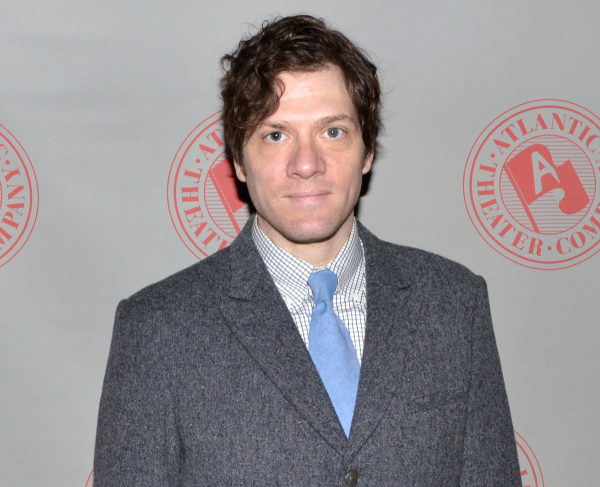Playwright Adam Rapp on Directing the New Tribeca Film Festival Entry Loitering With Intent
It's well-known in theater circles that prolific playwright Adam Rapp likes to direct his own work. Just look at his résumé: Most of his acclaimed stage dramas have been helmed by him, including the Pulitzer finalist Red Light Winter, as well as the screen adaptation of his play Blackbird and his original 2005 film Winter Passing. Now, Rapp is branching out. His latest film, Loitering With Intent comes from a screenplay he didn't write, penned by Ivan Martin and Michael Godere. TheaterMania chatted with Rapp about this new romantic dramedy, which premieres today at the Tribeca Film Festival.

(© David Gordon)
How did Loitering With Intent come into your hands?
I was set up to direct the film version of [my play] Red Light Winter with the same producers, and we had a couple of casts together and a couple of actors pulled out. We had been through so much pre-production together, and they hadn't found a director for Loitering With Intent, and they came to me because they knew I knew [cast member] Sam Rockwell. [Screenwriters] Ivan Martin and Michael Godere had sent me an early draft, but it didn't time out right. Because my thing fell apart, I read it again and said, "Yeah, let's do it." I wanted to work with Sam, and I knew [cast member] Marisa Tomei too. I thought it would be a fun experience and would get my chops up again to do another film.
The other films you've directed were adapted from your own plays. What was it like to direct someone else's writing?
I never thought of directing something on film that I hadn't written. It was daunting from that respect. We did about a three-week pre-production dramaturgical process. Ivan and Michael were really open to my ideas. My instincts were to open it up; I had to encourage them to raise the stakes, and they did it beautifully. So I was acting as a dramaturg and pushing them to make things have more of an impact. The arc and character stuff were always there, but it was about getting them to create more tension. I've always felt comfortable trying to get as much tension as possible. What's liberating is that I didn't even write a word. A very low percentage of what's said in the film is actually something from me.
In what ways is directing for the screen different from directing for the stage?
It's so much more about composition and a much more technical endeavor about what you place in the frame. Film directing has perfected my theater directing. I think when I first started directing, a lot of my stuff was very lateral; I was afraid to have the actors' backs turned away, afraid to put them too far upstage, and I think once I did more things with film, I got more interested in composition. Whoever does both will know you get so little rehearsal with film that you're in the hands of chaos. With film, it's so fast and furious and you're at the mercy of the machine. When you're filming something, you have to be the calmest person and the most poised person in the area even if you're falling apart, because everyone is looking for you to be that. It's nineteen days of no sleep and eating bad food. I fell apart at the end of all three of the films I directed. It's exhausting. I find it much healthier to do theater. [laughs]
Is working with theater actors who do films easier than working with actors who do only screen work?
The process is so compressed with independent films. You don't know if your actors have good work habits [like theater actors do], and if they don't come prepared, you're doomed. They're also coming from another film set [that they were just working on]. On my first film, I had two conversations with Ed Harris over the phone and then we had a four-hour work session with the principals and that's it. [Film actors] are coming from another film set. When I work in the theater, you know you'll get this almost devotional, religious experience where you're breaking bread with everyone every day. There's so much more trust, and there's something so spiritual about that. I'm always excited about bringing theater people in front of the camera because they're used to doing six weeks of rehearsal and previews.
You have a play going up in California at the moment, right?
There's a play that's opening next week at the Pacific Playwrights Festival that South Coast Repertory commissioned. It's called The Purple Lights of Joppa Illinois. It's about a guy who's been in a psychiatric hospital for thirteen years after a tragic accident when he accidentally killed a child. He's released and is being integrated back into society. He manages to find his daughter, who shows up at his house with her best friend. It's this small play where they're trying to figure out who they are to each other. I'm in pain because I'm not directing this play, but the guy doing it has done a really good job, I hear.
Is a Red Light Winter film still in the pipeline?
It's still in the pipeline with the same company. Once we get through Tribeca and seeing this film off into the world, we'll sit back down and strategize. When you're making under-million-dollar films, it becomes so much about actors' availability. When you're using big actors for small films, you're in second or third position to the big monoliths. I want to shoot it in the winter because it's so important. We were going to do all the exteriors in New York and Amsterdam, and that's still the plan. I think we can do it in three weeks. And then I'll get really tired again. [laughs]










